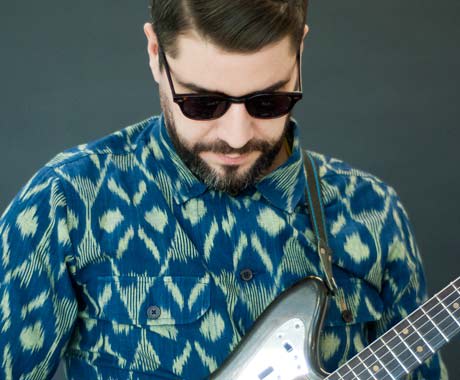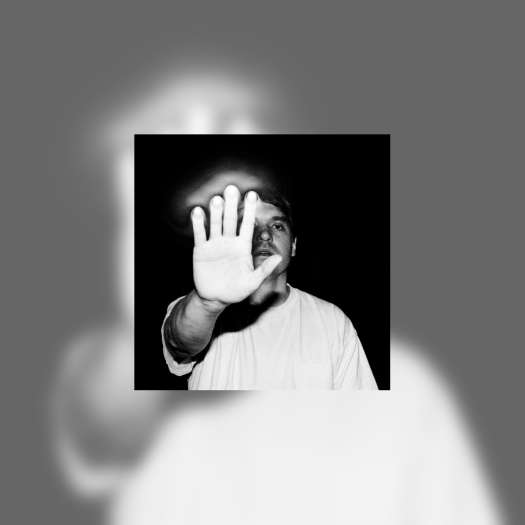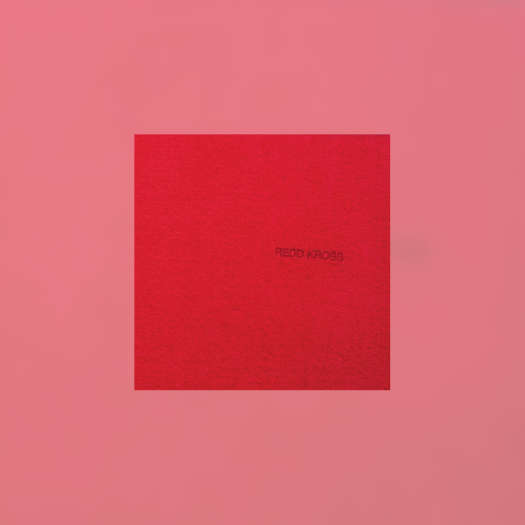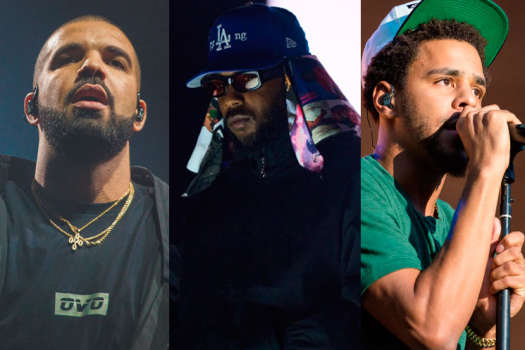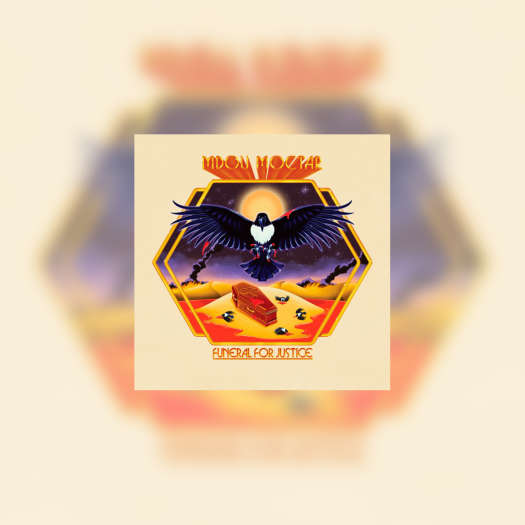Funk/soul/tropical beat conceptualist and renowned record collector, Will Holland, aka Quantic, recently released a career highlight among his 17 albums: Magnetica, on his longtime label, UK-based Tru Thoughts. Hailed as a return to his roots in electronic composition and production, it incorporates a wide variety of sounds and players from Colombia, Jamaica, the UK and U.S. Magnetica spurred him to hit the road with as a hybrid live/electronic quartet, and Exclaim! caught up to him on the day after the tour's final show at Club Soda as part of the Montreal Jazz Festival.
I thought last night's show really captured the album. The electronic elements could have sounded like a backing track but they didn't last night. It was very well integrated, which is a metaphor for the album. Was it a complicated undertaking?
The last band I played with was Ondatropica. That was 12 people on stage. This is a little more compact, even more so because we don't have lots of singers with us. It's quite hard sometimes to marry the electronic sounds with live instrumentation on a stage.
When I started out in England I had a lot of help from Ableton Live. I had a completely different setup and along the way I just ditched a lot of it, I simplified. I had grand ideas at the time "oh, we're going to loop live" — in actual fact from day to day it's actually quite hard to turn up and make sure it works in soundcheck. I was doing onstage sampling at the time and when it goes well it's fantastic but…
Magnetica is really diverse but brings in all the elements of your music that I've liked over the years into one place. Was that the intention?
In some respects, yeah. Firstly, over the last few years, I've had quite a diverse lifestyle. I've been living in Colombia and going to the UK a lot. DJing as Quantic in a lot of different locations. Playing with the Ondatropica band. So, I've had quite a rich setting in which to create music. I wanted to do more things with the record to represent certain sounds and over the years [then] coming back to this producer concept where you're affecting what you're into. I've mixed a lot of things along the way. I was associated with Ethiopian jazz and funk and soul but I never made that. I was a DJ, but I hadn't done on my own albums. This was about all fitting that somehow into a more easily digestible Quantic record. From a — I don't want to say marketing, but musical standpoint — sometimes it's easier to concentrate on a simple format. I'd been very much against [that] living in Colombia; I'd been working with more projects by several different names. Not really diluting things, but maybe complicating things. But especially with America and Canada and touring it seems like it's better to focus on one thing and keep at it, in terms of just getting on in the music industry.
And you've had a label (Tru Thoughts) that have been supportive through all the changes.
Yeah they have. They've always supported stuff. I've never sent them something like "aw, I'm not going to release this."
After 17 albums you know something about positioning your music. Who's interested in your music right now? Who do you want to be interested?
It's interesting — it really surprises me who's listening now. You never try to control it or adhere to that too much, cause I think people just find your music. It's about being happy with the end product, with the artistry of it, that you've come to a resting point that it's good music that speaks to people — it's just up to people to find it. I don't cater to a demographic.
I do feel like we're in a post hip-hop or post rare groove — or whatever you want to call it — era. My generation was always into hip-hop — not even hip-hop, but I came in with rare grooves. Like "beat producers" (e.g., Ninja Tune) and then deeper into sound. And now people are listening to more and more diverse music through that lens. People who were into breaks and beats but, you know, I don't think anyone plays break and beats anymore. It's just a bygone concept.
It's interesting what you say about people not caring so much about breaks and beats anymore. When I first started hearing about your music, vinyl fetishism was about the excavation but now it's come back in a completely different way, which arguably is not even connected to vinyl archaeology. Are you getting regard from new vinyl fans about the kind of sensibility you have?
I think it's a different era. They're connected in the sense of — I've worked a lot in compiling records, I worked with Soundway on the Panama series, the Colombia series, and Sound of Cumbia & Palenque Palenque compilations. I think that's where it kind of connects because a younger generation is buying records and visiting record shops. Those compilations really cater to that. We sell records like never before, much more than CD. Which is kind of hard because the three records in the gatefold package probably weighs a kilo a record!
There was an interview that you gave to The Guardian earlier this year about [cultural] appropriation. Have the politics surrounding working with musicians and labels in Colombia been much more scrutinized by people around the world?
I dunno, I feel it's different for me because I'm working directly with people so it's not like it's the case where I'm just an artwork is for sale. I work directly with musicians and to be honest everyone I work with wants to work together.
The key quote from that article was that "you never get this question asked from the inside," that really resonated with me. Do you feel that people who worry the most about appropriation are the people who have the least contact with musicians?
Yeah maybe — it's not the people who are making it. We don't care, we're just musicians who make what we want. On some level, it's not a performance question, it's a question about author's rights and that's another issue. That's another issue, whether people give honour to the original writers. That is more of an issue. Colombia knows what it's doing. Colombian musicians know what they're doing, those guys have been doing it for years, we just came and asked them if they're up for it. We had a lovely time and recorded for the album. They have rights on the record. There's no smoky old-style music contract business.
I thought last night's show really captured the album. The electronic elements could have sounded like a backing track but they didn't last night. It was very well integrated, which is a metaphor for the album. Was it a complicated undertaking?
The last band I played with was Ondatropica. That was 12 people on stage. This is a little more compact, even more so because we don't have lots of singers with us. It's quite hard sometimes to marry the electronic sounds with live instrumentation on a stage.
When I started out in England I had a lot of help from Ableton Live. I had a completely different setup and along the way I just ditched a lot of it, I simplified. I had grand ideas at the time "oh, we're going to loop live" — in actual fact from day to day it's actually quite hard to turn up and make sure it works in soundcheck. I was doing onstage sampling at the time and when it goes well it's fantastic but…
Magnetica is really diverse but brings in all the elements of your music that I've liked over the years into one place. Was that the intention?
In some respects, yeah. Firstly, over the last few years, I've had quite a diverse lifestyle. I've been living in Colombia and going to the UK a lot. DJing as Quantic in a lot of different locations. Playing with the Ondatropica band. So, I've had quite a rich setting in which to create music. I wanted to do more things with the record to represent certain sounds and over the years [then] coming back to this producer concept where you're affecting what you're into. I've mixed a lot of things along the way. I was associated with Ethiopian jazz and funk and soul but I never made that. I was a DJ, but I hadn't done on my own albums. This was about all fitting that somehow into a more easily digestible Quantic record. From a — I don't want to say marketing, but musical standpoint — sometimes it's easier to concentrate on a simple format. I'd been very much against [that] living in Colombia; I'd been working with more projects by several different names. Not really diluting things, but maybe complicating things. But especially with America and Canada and touring it seems like it's better to focus on one thing and keep at it, in terms of just getting on in the music industry.
And you've had a label (Tru Thoughts) that have been supportive through all the changes.
Yeah they have. They've always supported stuff. I've never sent them something like "aw, I'm not going to release this."
After 17 albums you know something about positioning your music. Who's interested in your music right now? Who do you want to be interested?
It's interesting — it really surprises me who's listening now. You never try to control it or adhere to that too much, cause I think people just find your music. It's about being happy with the end product, with the artistry of it, that you've come to a resting point that it's good music that speaks to people — it's just up to people to find it. I don't cater to a demographic.
I do feel like we're in a post hip-hop or post rare groove — or whatever you want to call it — era. My generation was always into hip-hop — not even hip-hop, but I came in with rare grooves. Like "beat producers" (e.g., Ninja Tune) and then deeper into sound. And now people are listening to more and more diverse music through that lens. People who were into breaks and beats but, you know, I don't think anyone plays break and beats anymore. It's just a bygone concept.
It's interesting what you say about people not caring so much about breaks and beats anymore. When I first started hearing about your music, vinyl fetishism was about the excavation but now it's come back in a completely different way, which arguably is not even connected to vinyl archaeology. Are you getting regard from new vinyl fans about the kind of sensibility you have?
I think it's a different era. They're connected in the sense of — I've worked a lot in compiling records, I worked with Soundway on the Panama series, the Colombia series, and Sound of Cumbia & Palenque Palenque compilations. I think that's where it kind of connects because a younger generation is buying records and visiting record shops. Those compilations really cater to that. We sell records like never before, much more than CD. Which is kind of hard because the three records in the gatefold package probably weighs a kilo a record!
There was an interview that you gave to The Guardian earlier this year about [cultural] appropriation. Have the politics surrounding working with musicians and labels in Colombia been much more scrutinized by people around the world?
I dunno, I feel it's different for me because I'm working directly with people so it's not like it's the case where I'm just an artwork is for sale. I work directly with musicians and to be honest everyone I work with wants to work together.
The key quote from that article was that "you never get this question asked from the inside," that really resonated with me. Do you feel that people who worry the most about appropriation are the people who have the least contact with musicians?
Yeah maybe — it's not the people who are making it. We don't care, we're just musicians who make what we want. On some level, it's not a performance question, it's a question about author's rights and that's another issue. That's another issue, whether people give honour to the original writers. That is more of an issue. Colombia knows what it's doing. Colombian musicians know what they're doing, those guys have been doing it for years, we just came and asked them if they're up for it. We had a lovely time and recorded for the album. They have rights on the record. There's no smoky old-style music contract business.
